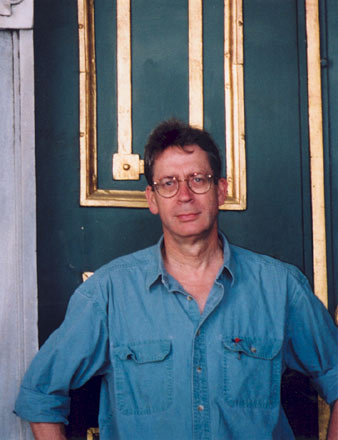Biography
 Richard Tillinghast is the author of eight books of poetry and three books of non-fiction. His first poetry collection was Sleep Watch, 1969. His first collection was Sleep Watch, 1969. At the time James Dickey called its author “the best poet of the younger generation, and deserving of more recognition than most of the poets in the older generation: that is, mine and the one beyond it.” Sleep Watch was followed by The Knife and Other Poems in 1980, Sewanee in Ruins in 1981, and Our Flag Was Still There in 1984. Two books of poems from the 1990s include The Stonecutter’s Hand, David R. Godine, 1995, and Today in the Café Trieste, 1997, new and selected poems issued by Salmon Publishing in Ireland. Of The Stonecutter’s Hand, Louis Simpson wrote:
Richard Tillinghast is the author of eight books of poetry and three books of non-fiction. His first poetry collection was Sleep Watch, 1969. His first collection was Sleep Watch, 1969. At the time James Dickey called its author “the best poet of the younger generation, and deserving of more recognition than most of the poets in the older generation: that is, mine and the one beyond it.” Sleep Watch was followed by The Knife and Other Poems in 1980, Sewanee in Ruins in 1981, and Our Flag Was Still There in 1984. Two books of poems from the 1990s include The Stonecutter’s Hand, David R. Godine, 1995, and Today in the Café Trieste, 1997, new and selected poems issued by Salmon Publishing in Ireland. Of The Stonecutter’s Hand, Louis Simpson wrote:
Tillinghast’s poems range confidently among different cultures. He has a sense of history as a living force. The experiments in meter, rhyme, and free verse in The Stonecutter’s Hand are important. He is a wonderfully gifted poet, one of the few.
Damaged Grandeur, a critical memoir of the poet Robert Lowell, whom he studied with at Harvard in the mid-sixties, appeared in the University of Michigan Press’s Poets on Poetry series in 1995. Richard’s most recent books are Six Mile Mountain, a collection of poems published in 2000 by Story Line Press and Poetry and What Is Real, a collection of literary essays published in 2004 by the University of Michigan Press. Of Six Mile Mountain, Eavan Boland wrote:
These powerful, deceptive poems appear to be about place. At first sight, they engage and enchant us with the eloquences and cadences of objects and distances: strange headstones, unfamiliar peat smoke and faraway drift fishing. But the force of this work is to make us wake from those enchantments to see that these are, in fact, not poems of place, but of displacement. It is the pain and waywardness of that displacement which makes these poems, finally, so compelling.
In 1997 he also edited A Visit to the Gallery, a miscellany of ekphrastic poems written by a group of poets he invited to respond to paintings at the Museum of Art at the University of Michigan, published by the University of Michigan Press.
In 2008 three new books are scheduled for publication. Finding Ireland, subtitled “A poet’s explorations of Irish literature and culture,” is due out from the University of Notre Dame Press. The New Life, poems, will be published by Copper Beech. In collaboration with his daughter, Julia Clare Tillinghast, Richard will publish a book of translations from Turkish called Dirty August, selected poems of Edip Cansever, with Talisman Books. Of The New Life, Linda Gregerson has written:
“Lick of white” on “the woodwork framing a north-facing window.” “Treachery / and blandness and stupidity” and the “marks (they’ve) made on the heart.” Between these opposing poles, The New Life charts its human course. There’s no going back to innocence for sullied creatures like ourselves, but achingly captured in these poems is that perdurable wish. And in freshwater lines of poetry—the purest, most limpid he has ever written—Richard Tillinghast finds something “the polluted tides of history” have not yet overwhelmed.
For twenty years beginning in the 1980s Tillinghast reviewed new poetry for the New York Times Book Review. He has also reviewed and written literary essays for the Wall Street Journal, the Washington Post and The New Criterion, as well as writing travel articles for the Times and other magazines. His poems have appeared in the Atlantic Monthly, Paris Review, The New Yorker, Poetry, The New Republic, Poetry London, Poetry Ireland Review, as well as online on Slate, Poetry Daily and elsewhere. Now that he is living in Ireland, he reviews frequently for The Irish Times and the Dublin Review of Books. His poems have also been featured on Garrison Keillor’s NPR show, “The Writer’s Almanac.”
 Tillinghast has also performed his poems with music; in 1998 he released a poetry/music CD, “My Only Friends Were the Wolves” with the jazz-fusion group Poignant Plecostomus. His interest in music began early, and he plays the guitar and sings. For years he also played the drums, beginning in the band at Central High School in Memphis. For several years he played rock ‘n’ roll and country music in nightclubs and at dances around Memphis. In the early seventies he also played in bar bands in Marin County, California, where he lived at the time. The visual arts are also important to him. As a young man he took painting and drawing classes at the Memphis Academy of Art. Currently he writes about art and architecture for The Hudson Review and The New Criterion. His absorption in art and music is reflected in the vivid imagery and emphasis on sound in his poems.
Tillinghast has also performed his poems with music; in 1998 he released a poetry/music CD, “My Only Friends Were the Wolves” with the jazz-fusion group Poignant Plecostomus. His interest in music began early, and he plays the guitar and sings. For years he also played the drums, beginning in the band at Central High School in Memphis. For several years he played rock ‘n’ roll and country music in nightclubs and at dances around Memphis. In the early seventies he also played in bar bands in Marin County, California, where he lived at the time. The visual arts are also important to him. As a young man he took painting and drawing classes at the Memphis Academy of Art. Currently he writes about art and architecture for The Hudson Review and The New Criterion. His absorption in art and music is reflected in the vivid imagery and emphasis on sound in his poems.
A member of the faculty at Harvard, Sewanee, and Berkeley before moving to Ann Arbor in 1983, Richard taught in the Michigan MFA program before taking early retirement in 2005 and moving to County Tipperary. He has also been a member of the faculty at the Poets’ House in Ireland, the Omega Institute in upstate New York, the Block Island Poetry Project in Rhode Island, the Lama Foundation in New Mexico, and the Bread Loaf Writers’ Conference in Vermont. He founded the Bear River Writers’ Conference in 2000 was Director until 2005.
Travel and change have always been a part of this poet’s life and work. Each of his collections of poetry reflects his restlessness and need to reinvent his way of writing. His first book, Sleep Watch, published as part of the Wesleyan Poetry Program, is divided into three parts—one section in rhyme and meter, one section of very experimental poems, and the third containing a single long, autobiographical poem, “The Old Mill.” He returned to rhyme and meter in The Stonecutter’s Hand, 1995, and Six Mile Mountain, 2000. “Fossils, Metal, and the Blue Limit” from Our Flag Was Still There and the book-length historical narrative Sewanee in Ruins, reflect his fascination with the long poem.
“Views of the Indies,” from The Knife and Other Poems, 1980, presents a version of the lives of the poor in third-world countries from India to the Caribbean, partially influenced by the prophetic reggae poetry of Bob Marley. An overland trip he made through Turkey, Iran, Afghanistan, and Pakistan as far as India and Nepal in 1970-71 has made a lasting impression. His attunement to the Islamic cultures of the Middle East is unusual among American and European writers. He is currently working on a prose book about Istanbul, chapters of which have been published in the Southern Review, AGNI, and the Gettysburg Review. He first visited Istanbul in 1964 and has returned there many times over the intervening years, learning Turkish in the late 1980s.
Tillinghast’s work has been rewarded with grants and fellowships from many sources. A fellowship from the Woodrow Wilson Foundation assisted him in his first year of graduate study at Harvard, and a Sinclair-Kennedy travel grant from that university allowed him to spend 1966-67 in Europe. A Creative Arts Institute Grant from University of California at Berkeley made it possible for him to make the trip to India referred to above. In 1980 a National Endowment for the Humanities Summer Stipend allowed him to study Robert Lowell's papers at Houghton Library, Harvard. In 1981 and 1982 he received the Margaret Bridgman Poetry Fellowship from the Bread Loaf Writers' Conference as well as a Mary Roberts Rinehart Foundation Grant. The University of Michigan awarded him a Rackham Faculty Fellowship, a Faculty Recognition Award, and several Achievement Awards from the Department of English. In 1986 he received a Creative Artist Grant from the Michigan Council for the Arts, and in 1989-90 he was a Faculty Associate at the Michigan Institute for the Humanities.
In the summer of 1990 the American Research Institute in Turkey awarded Tillinghast a fellowship to study advanced Turkish conversation at the University of the Bosphorus, Istanbul. Then in 1990-91 he and his family spent the year in Kinvara, County Galway, Ireland, with the assistance of the Amy Lowell Travel Fellowship. In 1992 he was awarded the Ann Stanford Prize for Poetry from the University of Southern California, and in 1992, 1993 and 1994 he received British Council Fellowships for study in Northern Ireland. In 1995-97 he was awarded Faculty Travel Grants from the International Institute at the University of Michigan. In 1999 he was nominated for the National Book Critics Circle’s Nona Balakian Award for Excellence in Book Reviewing.
In 2000-01 he received an Interdisciplinary Faculty Associates Grant from the Center for Research on Learning and Teaching at the University of Michigan, in 2003-4 a Creative Artist Grant from ArtServe Michigan’s Alliance for Arts Education and Cultural Advocacy. In 2003-04 he was given an Arts of Citizenship Grant for “Indigenous Voices,” a program at Bear River Writers’ Conference for collaboration with the Native American community in Northern Michigan. In 2006 he was the recipient of the James Dickey Poetry Prize from Five Points magazine. The Irish Arts Council gave him several travel grants in 2006 and 2007, and in 2008 awarded him a Literature Bursary. In May 2008 he was granted the honorary degree, Doctor of Letters, by the University of the South (Sewanee).
An extended Autobiographical Essay commissioned by Gale Research can be found on this website as well as in Contemporary Authors, Autobiography Series, vol. 23, published in 1997.